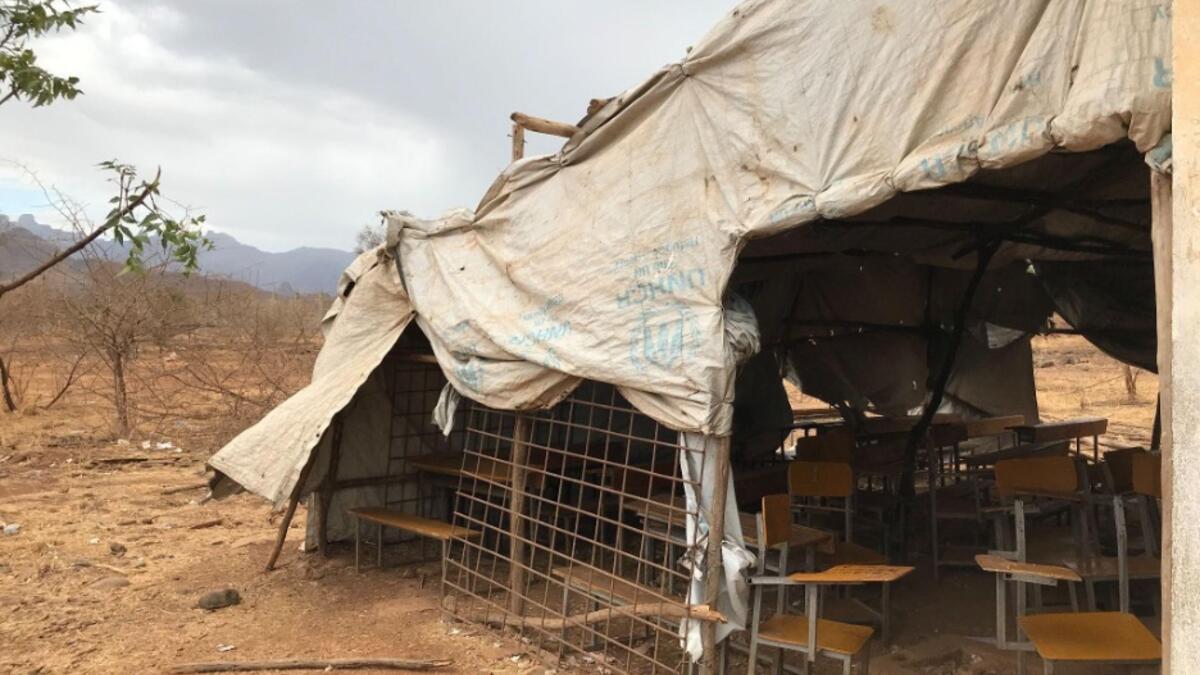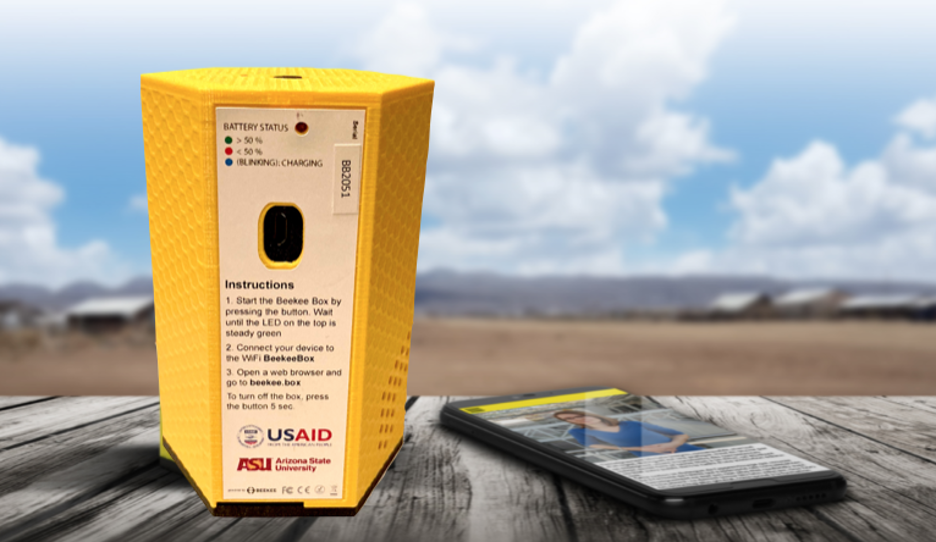Arizona State University is pioneering a game-changing new way to make education accessible to the many people around the world who live in areas with unreliable internet service.
SunSPOT, for Solar Powered Offline Teaching, is a model created within ASU that allows people to wirelessly connect their smartphone, tablet or shared computer directly to a device at a centralized classroom. Using open-source software, they can start engaging with their coursework in the classroom or transfer the content to their device to take home.
Lack of reliable internet is a huge problem around the world and an issue faced by Education for Humanity, ASU’s refugee education initiative, which has programs in about 20 countries.
Marc Alan Sperber, assistant director of Education for Humanity, led the creation and rollout of SunSPOT.
“One-third of the world’s population has never even used the internet, and many more than one-third don’t have reliable access,” he said.
Many of the Education for Humanity programs are offered in low- and middle-income countries where even unreliable internet can be prohibitively expensive.
“Many are being implemented in remote refugee camps with minimal infrastructure, and many are in unstable crisis contexts,” Sperber said.
"While far from being the only barrier, unreliable access to the internet plays a significant role in the fact that only 6% of refugees are able to access a higher education.
“Realistically, in the short term, getting the internet to these communities at scale is neither manageable nor affordable, and it certainly wouldn't be sustainable because the monthly internet bills would be in the millions of dollars,” he said.
“But it's immediately feasible and sustainable to bring offline-first learning to refugee communities at scale.”
So to close this gap, Sperber worked with others to design a flexible model that can be adapted by partner universities for their own distance-learning programs or managed by ASU units, such as Education for Humanity, for their own use.
Sperber worked with Beekee, a Swiss-based educational technology company that makes the Beekee Box and the Beekee Hub, portable hardware devices that SunSPOT learners connect to wirelessly.
After connecting, the learners use free apps such as Moodle or Kolibri, which are learning management systems that provide the lesson content and allow teachers to grade assignments and track student progress. Universities can use the system to push updated content to the field-based Beekee Hub and pull content back, such as homework assignments or learning analytics.
The Beekee device also can accept a SIM card, which can be used when it’s possible to connect to a cellular network. Because only one SIM card is needed for an entire learning community, this allows the project to be sustainable.
The Beekee devices don’t even require electricity. They can be charged and operated using a book-sized solar panel or an external battery system.
A Beekee Box. Photo courtesy Beekee
Sperber said he was particularly motivated to develop SunSPOT by the fact that a few years ago, Education for Humanity offered an entrepreneurship training program in Uganda, but only one-third of the students enrolled completed it and none of the young women did.
“This pilot was in Kampala, a capital city with good internet relative to most of where we work. This wasn't out in a remote refugee camp,” he said.
“Yet our partner's computer center still had horribly unreliable internet."
Learners would spend money on transportation to the computer center to participate in class only to discover that the internet was not working. Frustrated by the waste of time and money, they dropped out.
The SunSPOT model was shaped by Sperber’s work helping a USAID-funded project directed by the ASU Mary Lou Fulton Teachers College that needed a way to reach the most remote areas in Malawi with distance learning programs.
The southeastern African country of Malawi has struggled with getting enough skilled workers to grow the economy, in part because the programs offered by the country's public universities have been out of reach to most youth. With support from USAID, the ASU project, Strengthening Higher Education Access in Malawi Activity, or SHEAMA, has been focused on increasing the technical capacity of Malawi's higher education system and working with faculty to design and implement open, distance and e-learning courses that are aligned with market needs.
But connectivity was still a problem, exacerbated by the onset of the pandemic. An offline system was needed that the universities could each customize and manage. So Sperber worked with Beekee, and the company reworked its model, according to Sergio Estupiñán, a Beekee co-founder.
"Marc (Sperber)’s ideas were centered around the sustainability of initiatives that were initially relying on external funds and would eventually be without. He presented scenarios where funders will not want to invest in technologies that can only be purchased from one company, or that require annual contracts for ongoing tech support.
“We went from selling Beekee Boxes, Beekee Hubs and service contracts to being partners with ASU in their capacity-building efforts, taking full advantage of our open-source foundations and philosophies."
The SunSPOT model has already led to sustainable solutions, Sperber said. For example, the Malawian universities were trained on how to build, customize and manage their own SunSPOT systems, including the hardware and software. Then one of the universities decided to create a business around printing, assembling and supporting the systems for others in Malawi.
"This is exactly what you want to see in international development," said Stephen Feinson, associate vice president for the ASU International Development Initiative.
"We could walk away tomorrow and they would be able to continue rolling out and supporting new systems, extending the reach of their open, distance and e-learning programs indefinitely."
Going forward, Education for Humanity will use the SunSPOT offline-first model in all of its education programs, Sperber said, with support from the Mastercard Foundation in that pivoting process.
"Offline-first does not mean offline only," he said.
"Our courses will still be available online for learners who have access to the internet. Offline-first is more about our design approach, meaning that each time we make a design decision, we first think about the offline learner and making the entire experience great for them."
Sperber will be traveling to Lebanon this month to set up a refugee education program with SunSPOT.
Fewer populations face a more complex set of barriers in accessing a higher education than refugees, Sperber said. In 2017, when Education for Humanity launched, 1% of the world’s refugees were able to access higher education. Now it’s about 6%, he said. Education for Humanity typically offers courses to refugees in English, entrepreneurship and other skills-building subjects.
"Despite many successes, we've only been able to reach the tip of the iceberg," said Pamela DeLargy, Education for Humanity executive director and a professor of practice in politics and global studies.
"In crisis contexts around the world, there aren't the trained teachers or subject matter experts you need for face-to-face teaching.
“And even if there were, the unpaved roads going into refugee camps can get flooded when it rains, or travel into those regions can be sporadically off-limits because of security concerns.
“The way to reach refugees with education at scale has to include digital. But that's been a huge challenge because digital learning is primarily delivered online and so many displaced people around the world lack internet."
Top photo: An outdoor classroom in a refugee-hosting community in Tigray, Ethiopia. Photo courtesy Marc Alan Sperber
More Science and technology

ASU water polo player defends the goal — and our data
Marie Rudasics is the last line of defense.Six players advance across the pool with a single objective in mind: making sure that yellow hydrogrip ball finds its way into the net. Rudasics, goalkeeper…

Diagnosing data corruption
You are in your doctor’s office for your annual physical and you notice the change. This year, your doctor no longer has your health history in five-inch stack of paperwork fastened together with…
Large-scale study reveals true impact of ASU VR lab on science education
Students at Arizona State University love the Dreamscape Learn virtual reality biology experiences, and the intense engagement it creates is leading to higher grades and more persistence for biology…



